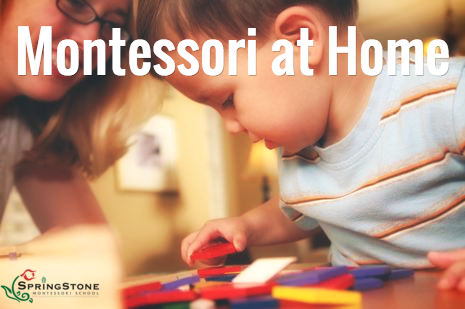Your Child’s Independence at Home

Do you have a child at home that loves to say ‘No’ or ‘I can do it myself!’? Your child is already getting a taste of independence – and child development experts have suggestions to help you and your child explore their independence at home.
Support independence early in your child’s life:
- As parents, we are our children’s primary teacher about the world and about themselves.
- When we allow them to try it ‘themselves’, we are literally teaching them that they are competent people who can successfully get their needs met.
Setting up a space at home to support independence can further help develop this competence.
Dr. Montessori called it the prepared environment:
- Self-serve drink/snack
- Allow your child to self-serve a healthy snack and drink from a small pitcher
- It teaches your child how to pay attention to their own thirst/hunger and meet those needs
- Your child benefits in practicing fine motor skills (pouring), and to try new foods as they are offered
- Provide necessary support/scaffolding
- Resist the urge to take over and do it yourself due to your own anxiety or impatience
- Scaffolding is like providing them a ladder, but they still have to climb it
- It fosters a growth mindset where they learn that they can reach their goals with persistence, even when it is hard
- When they need assistance, offer them just enough support to get them to the next step
Here are some household tasks your child can help with:
- Laundry – gather dirty clothes, sort clothes, pair socks, fold washcloths
- Wash windows and floors with spray bottle of water and vinegar
- Water plants, pull weeds, feed pets
- Wash vegetables and fruits in the sink
- Set and clear the table
- Unload and sort cutlery from the dishwasher
- Put clothes from washer into dryer
- Dust (Swiffer duster works well)
With everything your child contributes to your family household, please keep in mind to:
- Praise their effort, and support them when they struggle
- Expect mistakes; don’t criticize
- Empathize with their struggle, feelings of frustration
Benefits you will see in your child
- Over time, you will see a confident, independent child who takes healthy risks and believes he can succeed with initiative and effort
- Don’t be surprised if supporting your young child’s autonomy results in fewer tantrums and outbursts and greater compliance when you do need them to do something ‘your way’
- When children feel powerful over aspects of their lives, they are less likely to fight back when we put our foot down
The key is to give them opportunities to do things independently often – every day!

